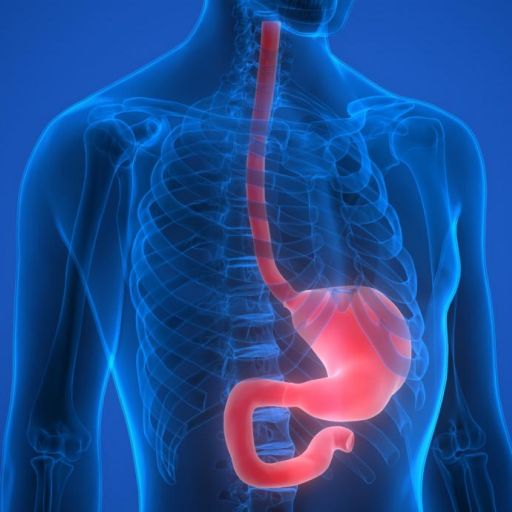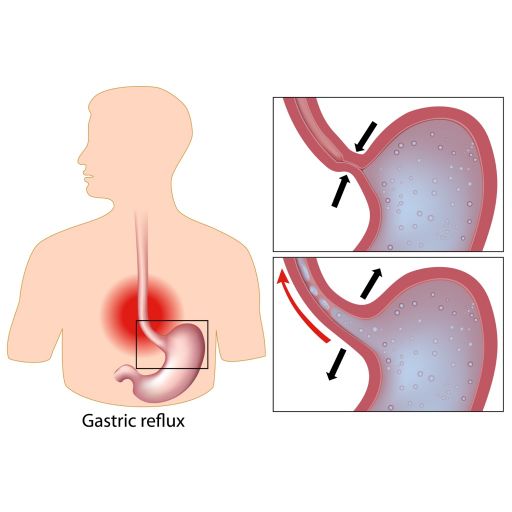The Link Between Acid Reflux And Esophageal Cancer
Acid reflux, which is commonly known as heartburn, is a burning sensation which an individual may feel in the chest or throat after eating certain foods. Many people must have experienced this problem at least once in their lives.
However, if you experience acid reflux frequently (two or three times per week), then it is a matter of concern. It can be a symptom of esophageal cancer.
Esophageal cancer can be described as uncontrolled growth of cells in the esophagus. The esophagus is a long tube which connects your throat with the stomach. It carries swallowed food from your throat to the stomach. In case of acid reflux, stomach acids can come up into your esophagus.
This can cause damages to your esophageal tissues over a certain period of time and increase your risks of esophageal cancer. In this article, we are going to describe about the types of esophageal cancer, symptoms, risk factors and the link between acid reflux and esophageal cancer.
Types of esophageal cancer
There are many types of esophageal cancer. The two main types of esophageal cancer are as follows:
●Adenocarcinoma: Adenocarcinoma is that type of esophageal cancer which begins in the cells of the glands present in the esophagus. These glands secrete mucus. This disease mainly occurs in the lower parts of the esophagus. It is the most common form of cancer in the United States of America or USA. It is believed that acid reflux increases the risks of developing adenocarcinoma.
●Squamous cell carcinoma: Another type of esophageal cancer is squamous cell carcinoma. This begins in the flat, thin cells on the surface of esophagus. This form of cancer usually occurs in the upper or middle parts of the esophagus. It is the most common form of cancer worldwide.

Is acid reflux responsible for esophageal cancer?
Experts believed that people who suffer frequently from acid reflux are at a slightly increased risk of developing esophageal cancer although they do not know the exact reason for this.
When acid reflux occurs, it causes your stomach acids to splash up into the lower part of your esophagus.
Your esophagus does not have any protection against those acids, unlike your stomach. This indicates that those acids can easily damage the tissue cells of your esophagus.
Sometimes tissue damage from acid reflux can cause Barrett’s esophagus. This is a condition which causes the tissue in the esophagus to be replaced with those tissues which are similar to the ones found in the intestines. These cells can develop into precancerous cells.
Although Barrett’s esophagus is generally associated with higher risks of developing esophageal cancer, majority of people who suffer from this condition never develop esophageal cancer.
However, you should keep in mind that people who have both Barrett’s esophagus and Gastroesophageal reflux disease or GERD are at higher risks of developing esophageal cancer compared to those who have either Barrett’s esophagus or GERD.
Symptoms of esophageal cancer
Esophageal cancer generally does not show any symptoms in its early stages. Individuals usually notice these symptoms once the cancer has reached an advanced stage. Some of the common symptoms of esophageal cancer are as follows:
●Difficulty swallowing, also known as dysphagia
●Unintentional weight loss, mainly due to dysphagia
●Hoarseness
●Bleeding in the esophagus
●Chronic cough
●Worsening indigestion or heartburn, commonly known as acid reflux

Risk factors associated with esophageal cancer
Some of the risk factors which are associated with esophageal cancer are as follows:
●Gender: Gender is one of the factors associated with esophageal cancer. According to some experts, men are more likely to develop this type of cancer than women.
●Tobacco: Another risk factor which is commonly associated with esophageal cancer is tobacco. The use tobacco and tobacco products like cigarette increases the chances of developing esophageal cancer
●Obesity: People who are suffering from obesity have a higher risk of developing esophageal cancer since they are more likely to suffer from chronic acid reflux
●Alcohol: Consumption of alcohol also increases the risks of esophageal cancer.
●Diet: Diet is also an important factor associated with esophageal cancer. Some studies have found that eating processed meat increases the risks of esophageal cancer. Overeating can also lead to this type of cancer. You can reduce the risks of esophageal cancer by eating more fruits and vegetables.
Outlook for someone with acid reflux and esophageal cancer
Outlook of a person depends on the stage of cancer. According to research conducted by some experts, an individual with localized esophageal cancer will have a survival rate of about approximately 43 percent.
A person with regional esophageal cancer will have a survival rate of about approximately 23 percent. A person with distant esophageal cancer will unfortunately have a survival rate of about approximately 5 percent only.
You should remember that these figures are unable to predict the actual outcome of any patient. Outlook of a patient usually depends on various factors, such as method of treatment, cancer’s response to that method of treatment and overall health of a person.

Can you prevent esophageal cancer if you have acid reflux?
Controlling acid reflux can be considered as one of the ways of preventing esophageal cancer. You can consult a doctor and discuss with him or her regarding the steps for controlling acid reflux. Some of these steps are:
●Not lying down just after finishing your meal, since lying down flat after eating will make it easier for stomach contents to go back into the esophagus
●Taking an antacid
●Avoiding consumption of tobacco and alcohol
●Losing a considerable amount of weight
●Eating more fruits and vegetables
Treatment for esophageal cancer
The type of treatment usually depends on the stage of cancer. Some of the major treatment procedures for esophageal cancer are:
●Surgery: Surgery is a preferable option during the early stages of esophageal cancer. A surgeon can remove the tumor completely. Sometimes this is done with an endoscope.
●Radiation: Radiation therapy is the use of high-energy beams for killing cancerous cells. Radiation can either be directed to the cancerous area from outside body or from within the body.
●Chemotherapy: Chemotherapy is the use of drugs for killing cancerous cells. Chemotherapy is often done in combination with radiation therapy.
Acid reflux can act as a symptom of esophageal cancer so it should not be taken lightly. If you experience acid reflux frequently, immediately consult a doctor.
OTHER NEWS
-
- Silver Haired Christmas: How Older Americans Celebrate the Heartwarming Holiday Season
- By mth 29 Sep,2024

-
- Strength training for seniors the key to slowing muscle loss
- By YL 15 Oct,2024

-
- Hiking in Autumn and Winter A Different Kind of Life for the Elderly
- By zyy 25 Sep,2024

-
- How seniors can stay healthy by walking during the fall and winter months
- By yl 29 Sep,2024

-
- A complete guide to outdoor hiking in the cool autumn weather for the elderly
- By yl 24 Sep,2024

-
- Scaling New Heights: The Unstoppable Senior Rock Climbers of America!
- By zyy 09 Oct,2024

-
- Greenery under the sunset - Gardening is a happy time for the elderly
- By LH 27 Sep,2024

-
- The appeal of the outdoors for seniors in the fall and winter in the USA!
- By zyy 27 Sep,2024

-
- Yoga for the elderly, fall and winter seasons for health and well-being
- By yl 26 Sep,2024

-
- Golf, an activity where you can enjoy the natural scenery!
- By LH 29 Sep,2024

-
- Warm and Worry-Free: A Guide to Keeping Seniors Healthy and Warm in Winter
- By MTH 10 Oct,2024

-
- Healthy living in old age, start your cycling journey!
- By LH 14 Oct,2024

 1
1 1
1